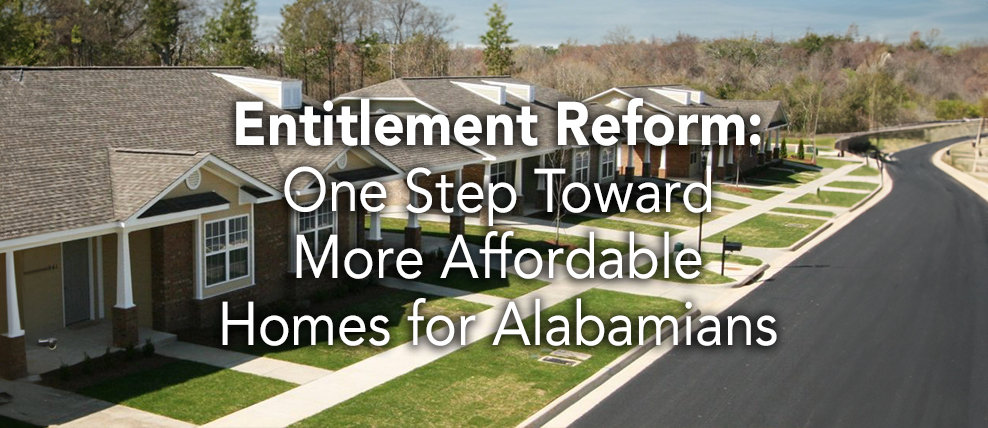Alabama has over 450 municipalities and 67 Counties. Each one has a different entitlement process and timeline. The lack of a uniform, streamlined, entitlement process throughout the state increases housing costs around the state and creates chaos for city employees, developers, and landowners alike.
The entitlement process typically involves three steps: 1) zoning; 2) preliminary plat approval; and 3) final plat approval. There is no uniformity, however, in how these steps are accomplished. Some municipalities/counties require engineered drawings of the proposed subdivision prior to rezoning, some have public hearings at each step, some require bonds of differing amounts, and some allow the steps to be completed in six months, while in others it can take years. The lack of uniform procedures and timelines for each step leads to higher development costs resulting in higher home prices and lower residential and commercial inventory.
Further, a uniform process would streamline entitlements statewide and eliminate any steps that cannot impact the final decision. For example, at the zoning hearing, support or opposition from adjoining landowners can be taken into account in the city’s decision. At the preliminary plat stage, however, if a “property owner complies with all applicable ordinances and regulations, he may not be denied legal use of his land merely because adjoining landowners object to that use.” Ex parte Frazer, 587 So.2d 330 (Ala. 1991). In other words, the objections of landowners at a preliminary plat hearing cannot change whether the plat complies with the ordinances and regulations. Either the plat complies or it doesn’t. Those hearings just put public officials in a no-win situation where they must either choose to 1) approve a compliant, but unpopular plat, and risk alienating constituents, or 2) deny the compliant plat and put the city at risk for costly litigation. Even one minor change to streamline the entitlement process—like eliminating post-zoning hearings—would save time and resources and remove public officials from a no-win situation.
Lack of affordable home inventory is a huge issue. The median Alabama household income is around $66,000, but according to The Alabama Center for Real Estate, the average cost of a new home is over $300,000. It’s no wonder the average age of a first-time homebuyer is 38. Less time and money spent on the entitlement process is just one small step in providing more affordable housing for all of Alabama.
In 2025, Florida legislators unanimously passed legislation to streamline its plat process and implement timelines for review and approval. Georgia has proposed an even more comprehensive bill to address affordable housing and has created the Georgia Residential Land Development Council, a coalition of housing development professional united to solve Georgia’s housing crisis. Alabama needs to start taking similar steps so that our citizens can afford to work here, live here, and raise their families here.

Terramoor is a trusted leader in identifying, acquiring, and developing key residential real estate opportunities for homebuilders, investors, and partners. From site selection to final platting, we help unlock a property’s full potential through strategic planning and efficient execution.

